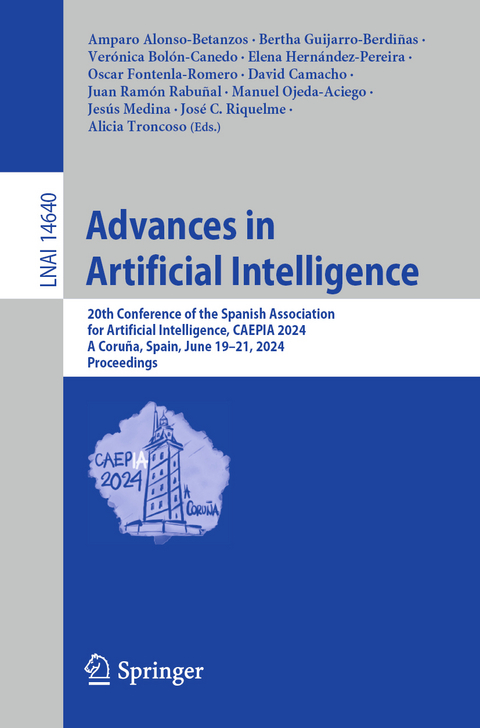
Advances in Artificial Intelligence
Springer International Publishing (Verlag)
978-3-031-62798-9 (ISBN)
This book constitutes the refereed proceedings of the 20th Conference of the Spanish Association for Artificial Intelligence, CAEPIA 2024, held in A Coruña, Spain, during June 19-21, 2024.
The 27 full papers presented in this book were carefully reviewed and selected from 38 submissions.
CAEPIA is a forum open to researchers from all over the world to present and discuss their latest scientific and technological advances in Artificial Intelligence (AI).
The papers cover such themes as: machine learning, search and optimization, creativity and AI, ontologies and knowledge graphs, education and AI, foundation, models and applications of AI, uncertainty in AI, ambient intelligence and smart environments, explainable and responsible AI, fuzzy logic, natural language processing, knowledge representation, reasoning and logic, constraints, search and planning, multi-agent systems, computer vision and robotics, and intelligent web and information retrieval.
.- Taking Advantage of Depth Information for Semantic Segmentation in Field-Measured Vineyards.
.- Advancing Computational Frontiers: Spiking Neural Networks in High-Energy Efficiency Computing Across Diverse Domains.
.- Deep Variational Auto-Encoder for Model-based Water Quality Patrolling with Intelligent Surface Vehicles.
.- An Architecture Towards Building a Reliable Suicide Information Chatbot.
.- Age estimation using soft labelling ordinal classification approaches.
.- O-Hydra: a hybrid convolutional and dictionary-based approach to Time Series Ordinal Classification.
.- Predicting Parkinson's Disease Progression: Analyzing Prodromal Stages through Machine Learning.
.- Ground-Level Ozone Forecasting using Explainable Machine Learning.
.- Multi-Objective Lagged Feature Selection based on Dependence Coefficient for Time-Series Forecasting.
.- FuSDG: A proposal for a fuzzy assessment of Sustainable Development goals achievement.
.- A surrogate assisted approach for fitness computation in robust optimization over time.
.- A Path Relinking-based approach for the Bi-Objective Double Floor Corridor Allocation Problem.
.- An Experimental Comparison of Qiskit and Pennylane for Hybrid Quantum-Classical Support Vector Machines.
.- Preserving the Essential Features in CNNs: Pruning and Analysis.
.- Iterated Local Search for the Facility Location problem with Limited Choice rule.
.- Driven PCTBagging: Seeking greater discriminating capacity for the same level of interpretability.
.- Semi-supervised learning methods for Semantic Segmentation of Polyps.
.- Community-Based Topic Modeling with Contextual Outlier Handling.
.- Toward Explaining Competitive Success in League of Legends: A Machine Learning Analysis.
.- Reconstruction-based Anomaly Detection in Wind Turbine Operation Time Series using Generative Models.
.- Multi-class and Multi-label Classification of an Assembly Task in Manufacturing.
.- Image Processing and Deep Learning Methods for the Semantic Segmentation of Blastocyst Structures.
.- Multivariate-Autoencoder flow-analogue method for heat waves reconstruction.
.- HEX-GNN: Hierarchical EXpanders for Node Classification.
.- The notion of bond in the multi-adjoint concept lattice framework.
.- Exploring the use of LLMs for teaching AI and Robotics concepts at a Master's Degree.
.- Exploring the Capabilities and Limitations of Neural Methods in the Maximum Cut.
| Erscheinungsdatum | 14.06.2024 |
|---|---|
| Reihe/Serie | Lecture Notes in Artificial Intelligence | Lecture Notes in Computer Science |
| Zusatzinfo | XVII, 276 p. 74 illus., 66 illus. in color. |
| Verlagsort | Cham |
| Sprache | englisch |
| Maße | 155 x 235 mm |
| Themenwelt | Informatik ► Theorie / Studium ► Künstliche Intelligenz / Robotik |
| Schlagworte | Applications • Applied computing for education • Artificial Intelligence • Computer Science • computer vision • Computing Methodologies • conference proceedings • Data Mining • Informatics • Information Systems Applications • Knowledge Representation and Reasoning • machine learning • Natural Language Processing • Research • Search Methodologies • vagueness and fuzzy logic |
| ISBN-10 | 3-031-62798-9 / 3031627989 |
| ISBN-13 | 978-3-031-62798-9 / 9783031627989 |
| Zustand | Neuware |
| Haben Sie eine Frage zum Produkt? |
aus dem Bereich


